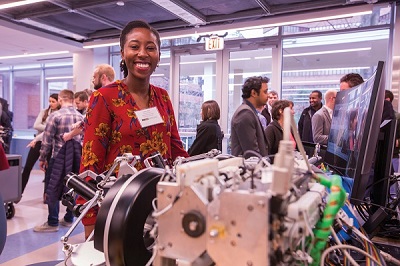GRADUATE STUDENT VIEWPOINT
By Colette Abah, Ph.D. candidate, Mechanical Engineering
My accent is a strange combination of French with a Cameroonian twist, and British English with a Nigerian twist. The strangest part is that I have only ever stepped foot in Nigeria once, in June 2019 for one weekend.
I was born and raised in Yaoundé, Cameroon (also known to soccer fans as Samuel Etoo’s country). Although French and English are Cameroon’s official languages, I grew up speaking only French. I learned English in school the same way most American kids learn Spanish or French in school—not very well.
At 16, I was awarded a scholarship to study the International Baccalaureate at the United World College of the Atlantic, an international school in Wales. I moved to a foreign country, by myself, with a minimal proficiency in the spoken language. It was there that I somehow picked up a Nigerian-British accent. I think it was by osmosis because many of my closest friends were from Nigeria.

It was also at United World College that I first learned about engineering. When I was ready to apply for college I wanted a discipline that combined my science background and my desire to create practical solutions to real-life challenges. After conversations with friends and the school’s guidance counsellor, I decided engineering was an excellent fit. I was admitted to Massachusetts Institute of Technology. Off to the United States I went, armed with my improved language skills and my odd accent.
I discovered my interest in research late in my undergraduate career. In the spring of my senior year I did a research project in a bioinstrumentation lab and enjoyed that experience so much that I decided to go to graduate school. As a stepping stone, I did a research fellowship at the Wyss Institute for Biologically Inspired Engineering at Harvard University. In fall 2015, Professor Robert Webster visited Harvard and gave a lecture about needle-size robots for minimally invasive surgery. That lecture and a subsequent phone conversation with him sold me on the surgical robotics program at Vanderbilt University.
In Fall 2016, I enrolled at Vanderbilt in mechanical engineering and joined Professor Nabil Simaan’s Advanced Robotics and Mechanism Applications laboratory. The Ph.D. journey has been an amazing (scary, thrilling, frustrating, exhilarating) learning experience so far.
Close collaboration with VUMC surgeons made Vanderbilt an especially attractive program for me, and one of my favourite aspects has been the relationship my lab has with VUMC’s Department of Neurological Surgery through the Vanderbilt Institute for Surgery and Engineering. As a VISE fellow, I shadowed Dr. Rohan Chitale, my clinical mentor, and observed several neuroendovascular procedures (e.g. stroke, aneurysms, AVM, etc). We identified knowledge and technical gaps in stroke care and formulated research questions that guide our current collaboration. The proximity of VUMC to our lab allows me to observe surgical cases multiple times a week.
Our team works toward expanding access to stroke care through robotic assistance. Being mentored by both a robotics expert and an endovascular surgery expert has challenged and improved how I think about implementing engineering solutions to bridge technical gaps in this field of care.